Swift developers are the backbone of iOS and macOS applications. They bring your app ideas to life, ensuring smooth and responsive user experiences on Apple devices.
Skills for Swift development include proficiency in the Swift programming language, understanding of Apple's development frameworks, and abilities in debugging and performance optimization. Additionally, strong problem-solving skills and effective communication are key.
Candidates can write these abilities in their resumes, but you can’t verify them without on-the-job Swift Developer skill tests.
In this post, we will explore 7 essential Swift Developer skills, 8 secondary skills and how to assess them so you can make informed hiring decisions.
Table of contents
7 fundamental Swift Developer skills and traits
The best skills for Swift Developers include Swift Proficiency, UI/UX Design, API Integration, Xcode IDE Expertise, Version Control, Problem Solving and Memory Management.
Let’s dive into the details by examining the 7 essential skills of a Swift Developer.
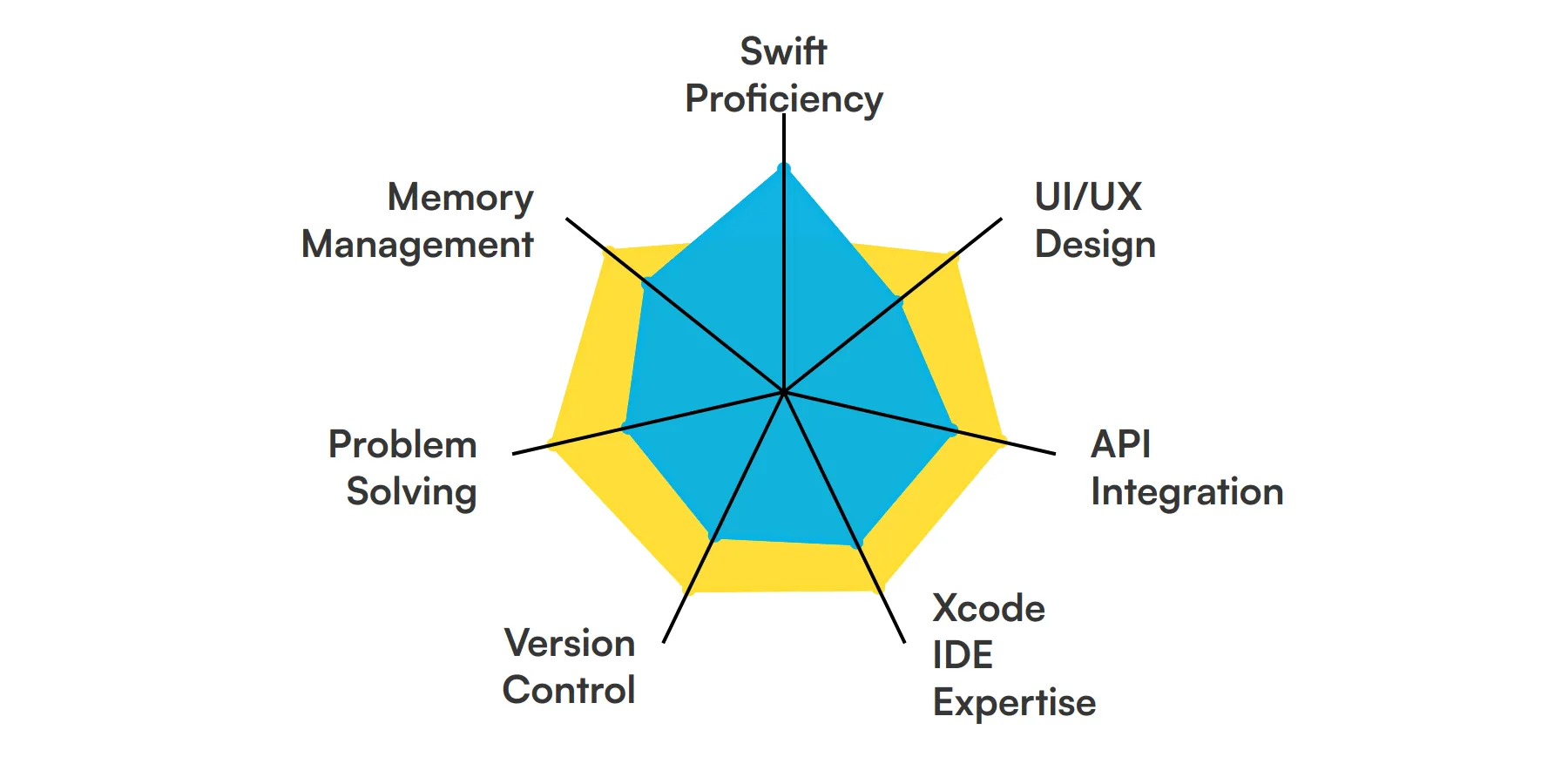
Swift Proficiency
A Swift developer must have a deep understanding of Swift, Apple's powerful and intuitive programming language. This skill is fundamental as it involves writing, analyzing, and optimizing Swift code to build iOS applications that are both efficient and scalable.
For more insights, check out our guide to writing a Swift Developer Job Description.
UI/UX Design
Understanding user interface (UI) and user experience (UX) design principles is crucial for Swift developers. They need to create apps that are not only functional but also engaging and easy to use, aligning with the high standards of design expected in Apple ecosystems.
API Integration
Swift developers often need to integrate third-party APIs into applications. This skill involves understanding RESTful services, handling JSON data, and ensuring that the app communicates effectively with web services to enhance functionality.
Xcode IDE Expertise
Proficiency in Xcode, Apple’s integrated development environment, is essential for Swift developers. It is used for writing Swift code, debugging, and managing project assets, making it a central tool in the development of iOS and macOS apps.
Version Control
Using version control systems like Git is necessary for Swift developers to manage changes to their codebase, collaborate with others, and maintain a history of project evolution. This skill helps in ensuring that the development process is smooth and error-free.
Check out our guide for a comprehensive list of interview questions.
Problem Solving
Swift developers must be adept at problem solving to effectively address bugs, performance issues, and design challenges that arise during app development. This skill is key to optimizing app functionality and user experience.
Memory Management
Understanding memory management in Swift, including the use of Automatic Reference Counting (ARC), is important for creating efficient applications. This skill helps in preventing memory leaks and ensuring that apps run smoothly.
8 secondary Swift Developer skills and traits
The best skills for Swift Developers include Core Data, Concurrency, Unit Testing, Continuous Integration, Design Patterns, App Store Deployment, Localization and Accessibility.
Let’s dive into the details by examining the 8 secondary skills of a Swift Developer.
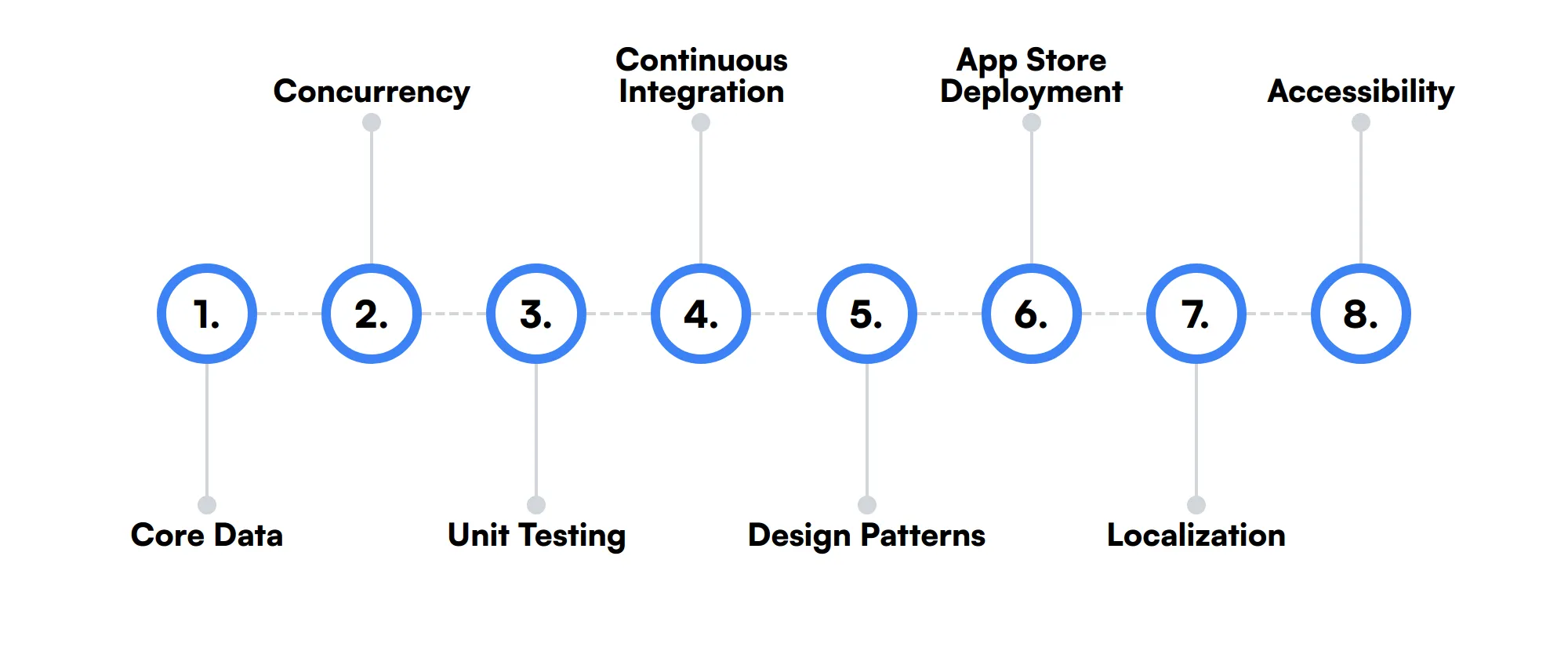
Core Data
Knowledge of Core Data helps Swift developers manage the model layer objects in their applications. It is useful for data storage and retrieval, making it easier to handle complex data-driven tasks within apps.
Concurrency
Concurrency in Swift, involving technologies like Grand Central Dispatch (GCD) and Operations, allows developers to perform tasks without blocking the main thread. This skill is important for improving app responsiveness and performance.
Unit Testing
Swift developers use unit testing to validate code functionality and minimize bugs during the development phase. Familiarity with testing frameworks like XCTest helps in building reliable and robust applications.
Continuous Integration
Experience with continuous integration tools such as Jenkins or Travis CI helps Swift developers automate the testing and deployment of their applications, enhancing productivity and reducing manual errors.
Design Patterns
Understanding common design patterns like MVC, MVVM, and Singleton is beneficial for Swift developers. These patterns help in organizing code more efficiently and solving common software design problems.
App Store Deployment
Knowledge of the process for deploying apps to the Apple App Store is useful for Swift developers. This includes managing app submissions, adhering to Apple’s guidelines, and handling updates.
Localization
Swift developers may need to adapt applications for multiple languages and regions. Skills in localization ensure that apps are accessible to a global audience, enhancing user engagement and satisfaction.
Accessibility
Implementing accessibility features is important for Swift developers to make apps usable for people with disabilities. This includes voice-over, dynamic type, and high contrast modes.
How to assess Swift Developer skills and traits
Assessing the skills and traits of a Swift Developer involves more than just glancing at their resume. It's about understanding their proficiency in Swift, their ability to design intuitive UI/UX, and their expertise in integrating APIs. You also need to evaluate their familiarity with Xcode IDE, their version control practices, and their problem-solving capabilities. Memory management is another critical area that can significantly impact the performance of the applications they develop.
Traditional hiring methods often fall short in providing a comprehensive view of a candidate's abilities. This is where skills-based assessments come into play. By using targeted tests, you can get a clearer picture of a developer's competencies and how they align with your project needs. Adaface on-the-job skill tests can help you achieve a 2x improved quality of hires and an 85% reduction in screening time.
Let’s look at how to assess Swift Developer skills with these 6 talent assessments.
Swift Online Test
Swift Online Test evaluates candidates on their knowledge of the Swift programming language, including syntax, semantics, and data types. The test also assesses the ability to write optimized Swift code and familiarity with iOS development concepts.
The test covers basics of Swift, data types, control flow, functions, classes and objects, optionals, error handling, collections, closures, and concurrency. It includes scenario-based MCQs and a coding question to evaluate hands-on programming skills.
Candidates who perform well demonstrate a strong grasp of Swift syntax, efficient coding practices, and a good understanding of iOS development concepts like UI design and the iOS SDK.
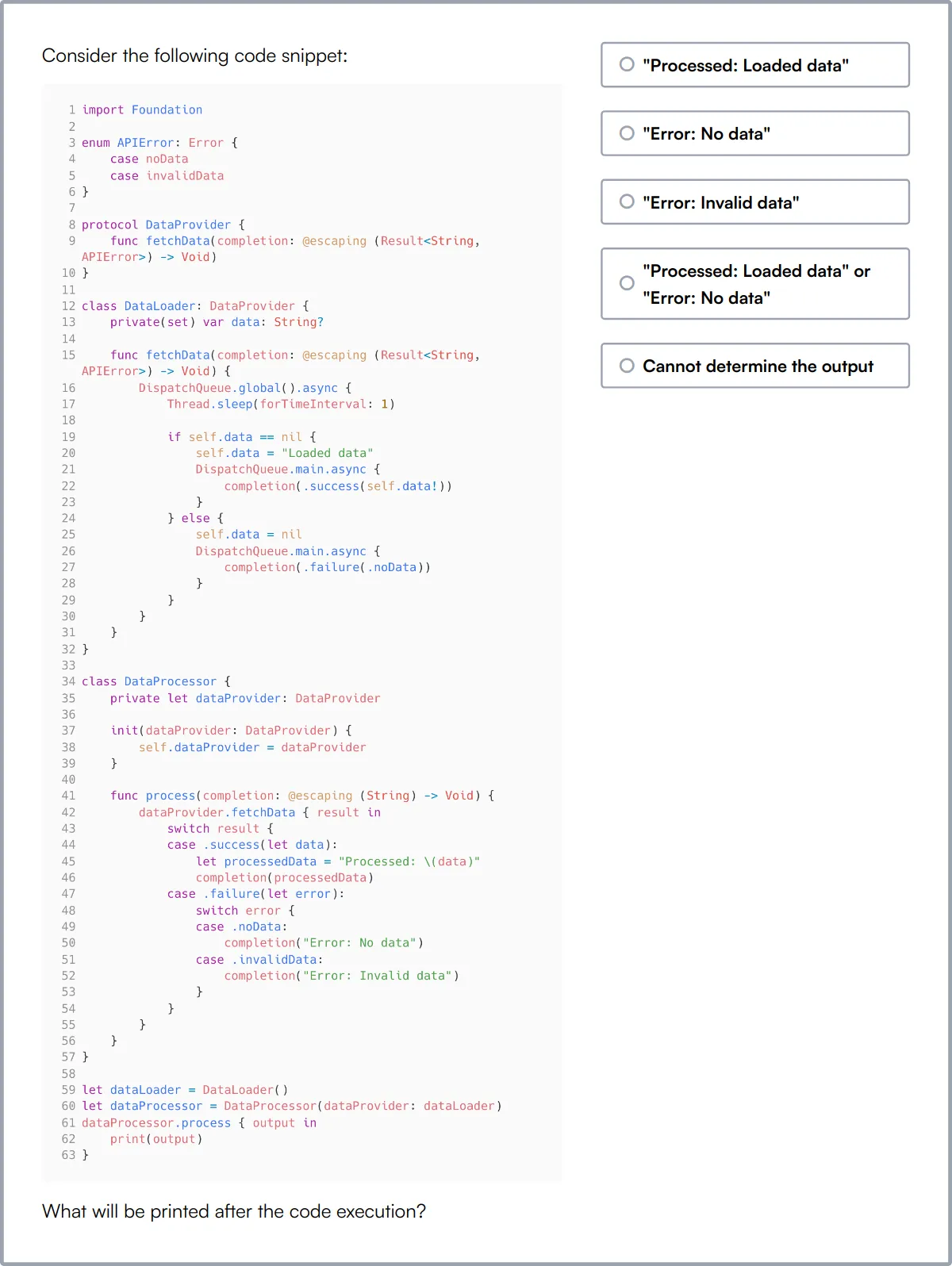
UI/UX Design Test
UI/UX Design Test focuses on assessing a candidate's product designing skills and their ability to create useful designs for feature requirements. It evaluates knowledge of wire-framing, prototyping, A/B testing, and UI/UX design principles.
The test covers design thinking, UX design principles, wire-framing, landing pages, customer journey, UI fundamentals, A/B testing, user research techniques, interaction design principles, visual design principles, information architecture, mobile app design considerations, accessibility guidelines, UX writing, and HCI fundamentals.
High-scoring candidates show proficiency in creating intuitive and user-friendly designs, understanding user needs, and applying design principles to enhance user experience.
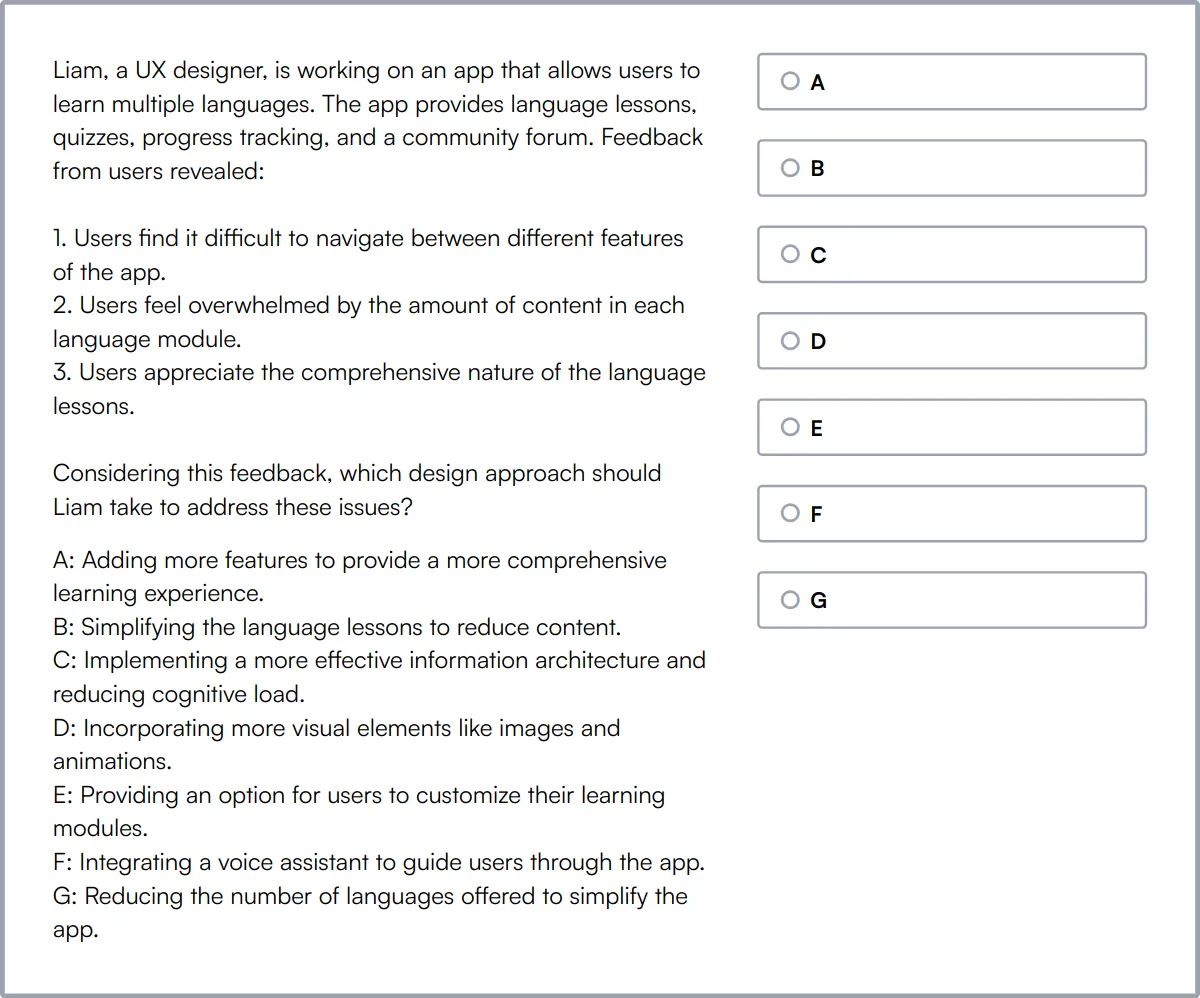
REST API Test
REST API Test evaluates a candidate's understanding of RESTful APIs and their ability to create, interact, and test them. The test includes multiple-choice questions and a coding question to assess practical skills.
The test covers technical aptitude, API integrations, REST API basics, API design, best practices, designing backend services, and coding. It evaluates knowledge of REST principles, HTTP methods, status codes, authentication, serialization formats, and best practices.
Successful candidates demonstrate a solid understanding of RESTful API concepts, best practices in API design, and the ability to implement and test APIs effectively.
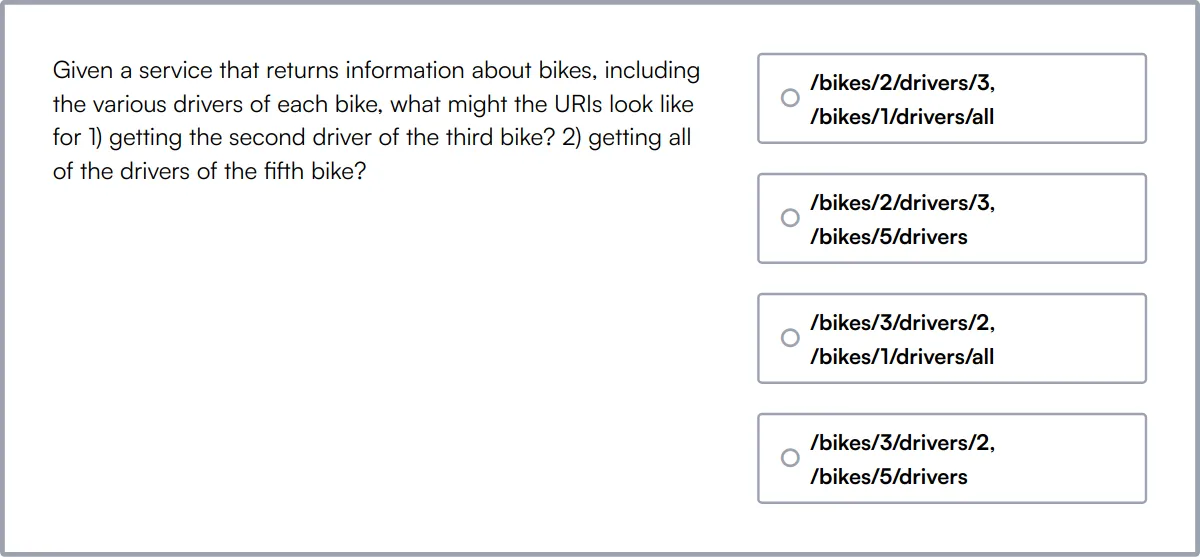
Swift & iOS Online Test
Swift & iOS Online Test assesses a candidate's knowledge of the Swift programming language and its application in iOS development. The test uses scenario-based MCQs and a coding question to evaluate hands-on programming skills.
The test covers Swift syntax, memory management, error handling, data structures, networking in iOS, user interface design, Core Data framework, concurrency in iOS, and Swift programming. It evaluates proficiency in key areas like syntax, memory management, protocols, and frameworks like UIKit, Foundation, and Core Data.
Candidates who excel in this test show a strong understanding of Swift and iOS development, including efficient memory management, error handling, and the ability to design and implement user interfaces.
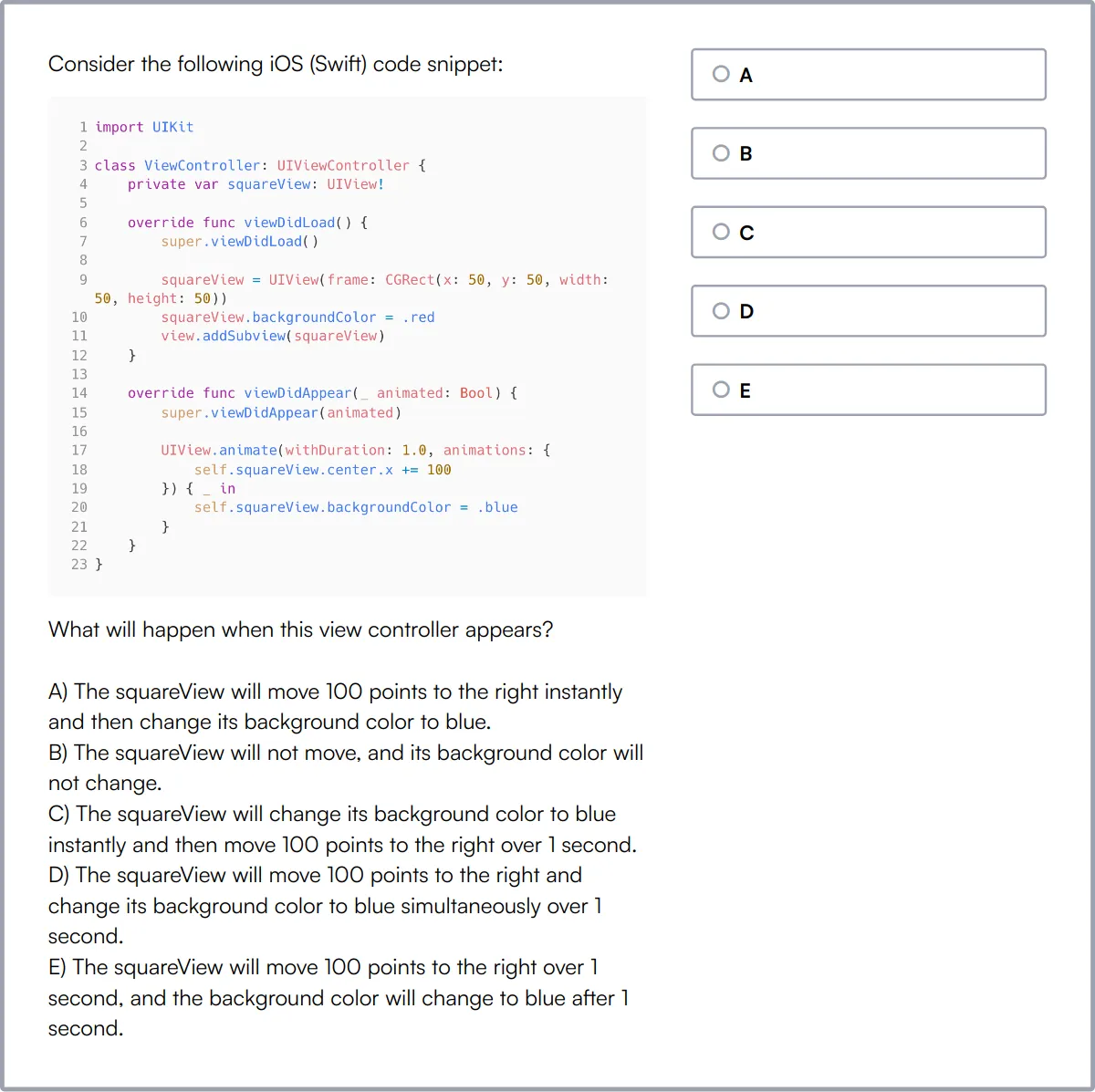
Git Online Test
Git Online Test evaluates candidates on their understanding of Git, a popular version control system. The test uses scenario-based MCQs to assess knowledge of basic and advanced Git commands.
The test covers Git basics, repository creation, branching and merging, committing changes, conflict resolution, remote repositories, rebasing, Git workflows, Git commands and concepts, and Git branching models.
Candidates who perform well demonstrate proficiency in using Git to manage source code, resolve conflicts, and implement effective branching and merging strategies.
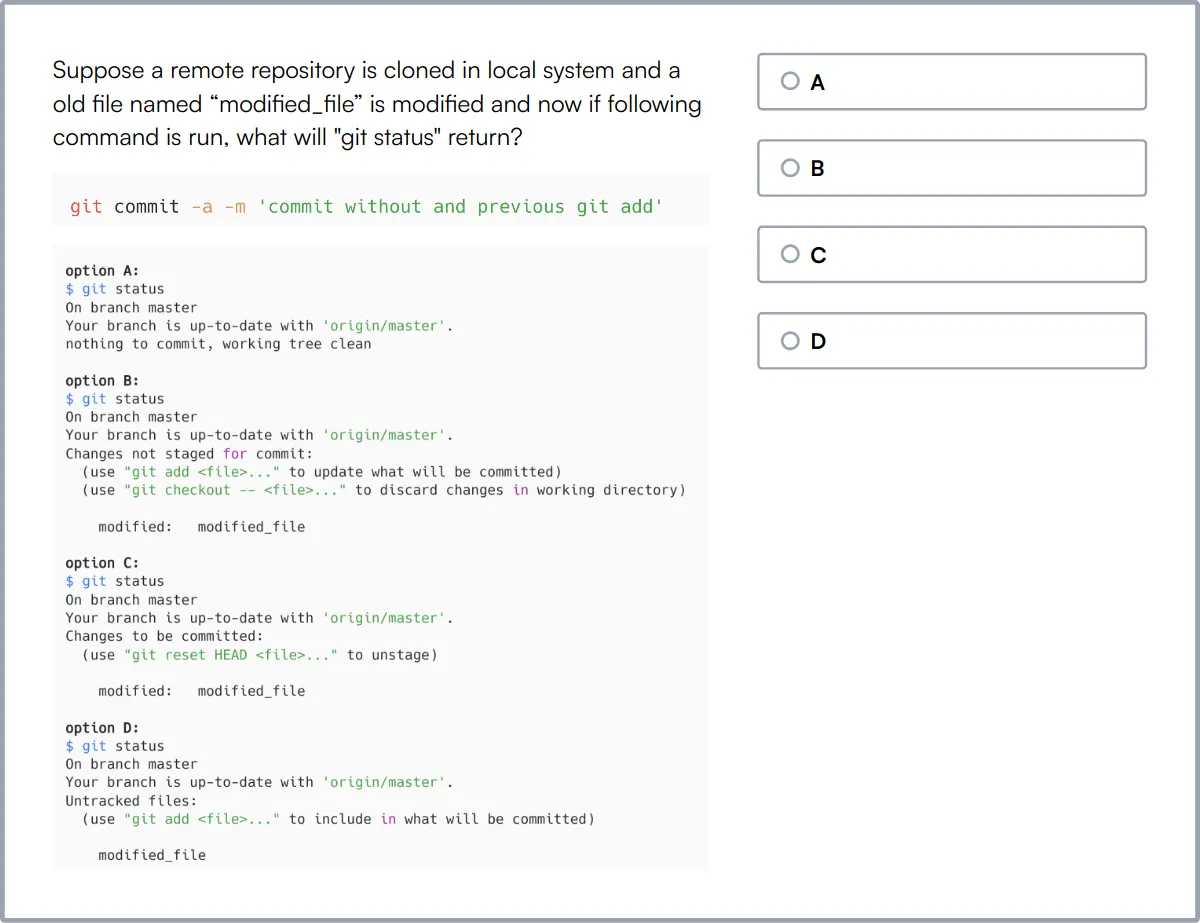
Problem Solving Test
Problem Solving Test evaluates a candidate's ability to understand instructions, analyze data, and respond to complex problems or situations. The test includes various types of reasoning questions to assess problem-solving skills.
The test covers abstract reasoning, critical thinking, deductive reasoning, inductive reasoning, pattern matching, and spatial reasoning. It provides insights into a candidate's problem-solving abilities, learning agility, and coachability.
High-scoring candidates demonstrate strong analytical skills, the ability to think critically, and the capacity to solve complex problems efficiently.
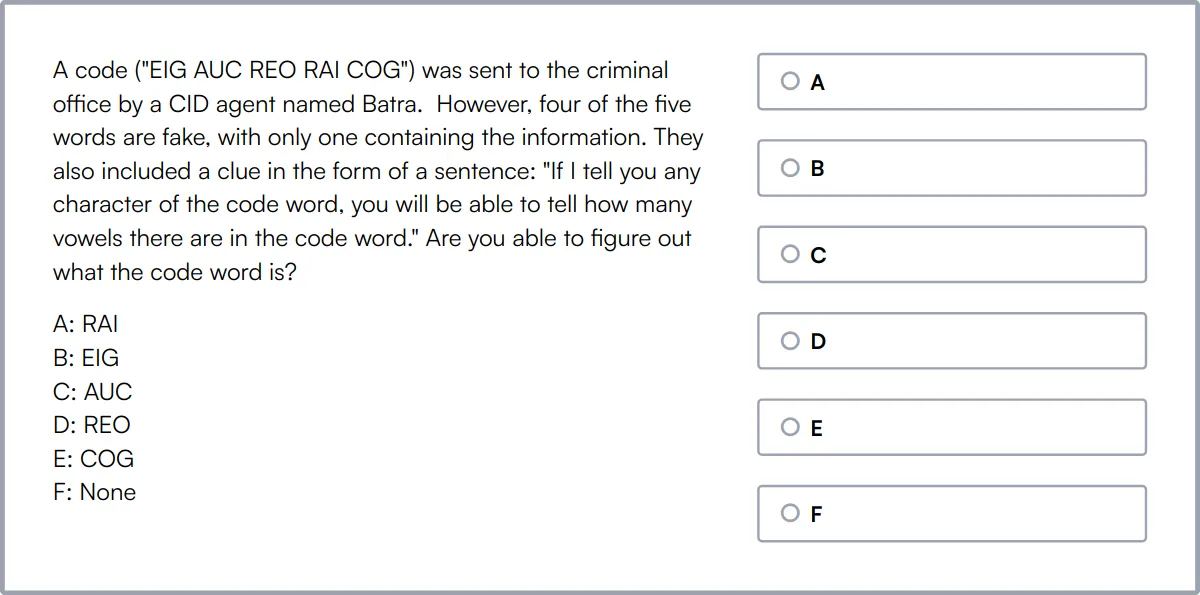
Summary: The 7 key Swift Developer skills and how to test for them
| Swift Developer skill | How to assess them |
|---|---|
| 1. Swift Proficiency | Evaluate developer's ability to write clean, efficient Swift code. |
| 2. UI/UX Design | Assess understanding and implementation of user-centered design principles. |
| 3. API Integration | Check developer's skill in connecting and utilizing external APIs. |
| 4. Xcode IDE Expertise | Test familiarity and efficiency with Xcode tools and workflows. |
| 5. Version Control | Review proficiency in using version control systems like Git. |
| 6. Problem Solving | Observe how a developer approaches and resolves coding challenges. |
| 7. Memory Management | Examine knowledge of managing memory in Swift applications. |
Swift Online Test
Swift Developer skills FAQs
What is the importance of Swift proficiency for a Swift Developer?
Swift proficiency is key for writing clean, efficient, and maintainable code. It ensures developers can leverage Swift's features to build high-performance iOS applications.
How can recruiters assess a candidate's UI/UX design skills?
Review their portfolio for visually appealing and user-friendly designs. Ask about their experience with design tools like Sketch or Figma and their understanding of Apple's Human Interface Guidelines.
Why is API integration important for Swift Developers?
API integration allows apps to communicate with external services. Assess candidates by asking about their experience with RESTful APIs, JSON parsing, and handling network requests.
What should recruiters look for in Xcode IDE expertise?
Check for familiarity with Xcode's features like Interface Builder, debugging tools, and performance analysis. Ask about their experience with Xcode's latest versions.
How can problem-solving skills be evaluated in Swift Developers?
Present candidates with coding challenges or real-world scenarios. Evaluate their approach to identifying issues, debugging, and implementing solutions.
What is the role of memory management in Swift development?
Memory management ensures efficient use of resources and prevents leaks. Assess knowledge of Automatic Reference Counting (ARC) and techniques to avoid retain cycles.
How can recruiters assess a candidate's experience with Core Data?
Ask about their experience with Core Data for data persistence. Look for knowledge of creating data models, fetching data, and handling migrations.
Why is concurrency important in Swift development?
Concurrency allows apps to perform multiple tasks simultaneously. Assess understanding of Grand Central Dispatch (GCD) and async/await for managing concurrent operations.

40 min skill tests.
No trick questions.
Accurate shortlisting.
We make it easy for you to find the best candidates in your pipeline with a 40 min skills test.
Try for freeRelated posts
Free resources



